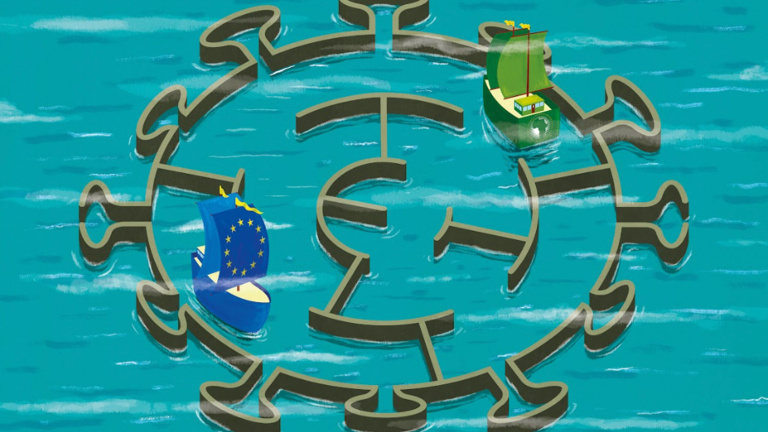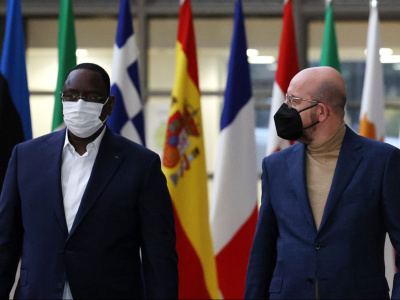
EU–AU partnership in research and innovation: Identifying strategies for equitable and sustainable research
The post-COVID-19 context: what position should Africa take to deal with the pandemic and adequately address the concerns of its people?
The coronavirus pandemic continues to pose challenges to health, education, research and production systems in Africa. Indeed, it has brought the entire global economy to its knees. The major powers (China, the United States, the European Union, Russia, Brazil and others) have been most affected, and “the outlook for global growth for 2020 … is negative – a recession at least as bad as during the global financial crisis [of 2008–9] or worse,” the IMF’s Managing Director Kristalina Georgieva has said. Africa should thus consider research and innovation (R&I) strategies to respond to the pandemic in order to reduce the economic impact of COVID-19 on the continent.
Which partnership model for research benefiting Africans?
African countries are encouraged to promote scientific diplomacy as a tool to facilitate innovation and collaboration in its areas of interest. Although there are many initiatives targeting Africa, it is up to Africans themselves to adopt the right strategy to ensure beneficial and more efficient cooperation. It would be to the advantage of African states to bolster initiatives like Caast Net Plus, an R&I collaboration between the European Union and sub-Saharan Africa providing a framework for reflection on global challenges such as food security, health and climate change. At the same time, it makes proposals and recommendations to policymakers to improve cooperation in science, technology and innovation (STI).
In addition, harmonisation efforts in African countries, in addition to the development of regional science and technology (S&T) policies, should be the foundation stone of successful scientific integration in Africa. To that end, it is important to move towards sub-regional or regional funds at the African level. One example is the West African Research Foundation, focusing on West Africa.
A major challenge to STI development in Africa is that the funding of high-profile research programmes and their prospects are driven by donors which, in most cases, demand results. The initiative for equitable research must therefore focus on themes of interest to the countries in the south to achieve optimal ownership of the research programmes by Africans. Low- and middle-income economies would need to contribute to joint research projects in order to negotiate project contracts for the equitable sharing of the benefits of collaborative research as part of the north–south partnership.
In order to connect innovation more effectively to African societal and environmental challenges, potential beneficiaries must be closely involved in project development and selection. It is in the same spirit that the innovation ecosystem must be intensively developed by bringing training and research structures, the socio-economic environment and the informal sector closer together by promoting research and development (R&D).
Skills development as a factor in innovation
The AU recognises STI as a tool for accelerating Africa’s transition to a knowledge- and innovation-based economy. STI will be crucial to making the vision embodied in the AU’s Agenda 2063 a reality. In order to derive maximum benefit from the EU–AU partnership, it is important to reflect on the development of human resources in terms of training through education and research for greater sustainability. In reality, sustainable, integral development geared towards meeting the economic needs of African countries will inevitably require a massive development of qualified S&T personnel capable of meeting Africa’s construction needs.
A failure to master basic and advanced technologies, to innovate and to shift training policies sufficiently towards STEM will deprive us of any possibility of participating, with any chance of success, in international competition involving the knowledge economy.
To take full advantage of foreign investment opportunities, it is crucial that the skills available should reflect the requirements of foreign investors and enable countries to attract innovative technologies rather than least-cost assembly tasks.
Establishing a prolific ecosystem of research infrastructures
There is undoubtedly an efficiency gain to be had in establishing regional joint research infrastructures. Developed countries are coming together to develop high technologies. Our governments must work to set up regional joint research platforms to share financial and human resources to form a critical mass (including scientists, teacher–researchers and evaluators) who will work on joint problems and provide solutions. For instance, the Committee of Ten Heads of State for the Acceleration of the Continental Education Strategy for Africa (CESA), the Science, Technology and Innovation Strategy for Africa (STISA 2024) and the Continental Strategy for Technical and Vocational Education and Training (TVET) to achieve Agenda 2063 aims call for the provision of knowledge-sharing platforms for STI and advanced digital technologies.
This is already the case in a number of African countries having established African centres of excellence (e.g. Senegal with the following centres: CEA-SAMEF, CEA-MITIC, CEA-AGRISAN and CEA-AGIR) which allow frameworks to be built to consolidate universities, research institutions and national, regional and international companies. These consortia will allow Africa in the near future to reach the level of Asian countries where 40 per cent of all doctoral students work in STI. These infrastructures also enable, alongside advanced disciplinary research teams, the development of multidisciplinary research to respond to the complexity of issues affecting Africa and the world.
Fostering innovation through evidence-based policy
It is essential that development policies should be based on the knowledge economy so that priorities – like agriculture, food security, emerging fields, renewable energies, building an efficient healthcare system and promoting the creation of competitive businesses – can emerge and their challenges are taken up. Accurate, reliable and relevant data must be used to measure the performance achieved in carrying out joint research programmes. Apart from the fact that STI indicators make it possible to monitor research programmes, increase knowledge transfer to the private sector and ensure effective management of research through coordination and networking, such data also inform STI policymakers.
The Science Granting Councils Initiative (SGCI) in sub-Saharan Africa plays a key role in building the capacities of the science granting councils to support evidence-based research and policies which will contribute to economic, social and environmental development. In addition, STISA advises AU member states to meet the target of allocating at least 1 per cent of their GDP to R&D so that the economic impact of research is felt in people’s lives.
All STI initiatives currently under way in the various African countries relevant to the main partnership themes must be mapped out to ensure that African concerns are better taken into account. The results and conclusions of the various workshops and seminars also need to be translated into action. Research partnerships between the EU and the AU should be demand-driven and priority-based. The launch of sub-regional (west, southern, central and east) councils will facilitate the establishment of competitive funds in respect of common priority themes such as infectious diseases, famine and environmental and security issues.
About the authors
Mamadou Sy is Director of strategies and planning of research / General directorate of research and innovation, Ministry of Higher Education, Research and innovation, Senegal
Full Professor of Mathematics at Gaston Berger University, Senegal, International Visitors Leadership Program (IVLP), Regular Associate (ICTP, Trieste, Italy), received a Master in Applied Mathematics and a Third Cycle Doctorate thesis in Mathematics from Gaston Berger University and a Ph.D. in Pure and Applied Mathematics from Blaise Pascal University, Clermont Ferrand, France. He is the Senegal’s team coordinator in the project Transformative Innovation Policy Africa (TIP-Africa), 2019, Coordinator of the project to set up the Institute of Advanced Science and Technology (ISTA), 2017-2019, Member of the Senegal’s Super-calculator project team, 2016-2020, Deputy director South of UMI-UMMISCO, IRD, since January 2014, Senegalese representative at the EU-Africa High Level Policy Dialogue on science, technology and Innovation (2016, 2017).
Mamadou Diouldé Diallo, is a researcher in Science, Technology and Innovation (STI) at the General Directorate of Research and Innovation, Ministry of Higher Education, Research and Innovation, Senegal.
Read the full magazine issue






